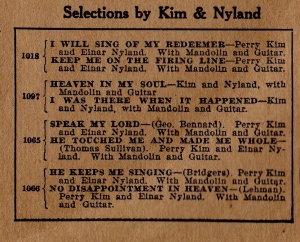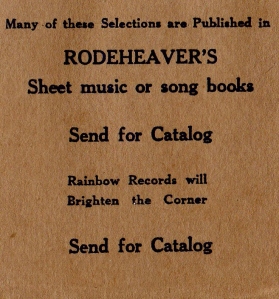Since the ARSC Journal (Vol. 39, 2008) published my The Rainbow Records Discography: 1920-1926 there have been a veritable wealth of discoveries about the label and its history. Founded by Billy Sunday’s songleader, Homer Rodeheaver (1880-1955) in 1920, Rainbow issued mostly small runs of Gospel records covering a wide range of interests and talent. Initially operated out of Rodeheaver’s huge music publishing concern based in Winona Lake, Indiana, Rainbow was a mission to bring Gospel music, stories and sermons to religiously inclined listeners. Although Rainbow was not successful in establishing a permanent foothold in the marketplace, such success as it had was copied by other labels, and by the end of the 1920s Gospel music of all kinds was being avidly recorded.
Foreign missionaries Perry Kim and Einar Nyland were a Gospel singing duo; they had met as students in Rodeheaver’s singing class in Winona Lake. Kim played guitar and Nyland, mandolin, and the two brightened many a corner at the Billy Sunday revival meetings of the early 1920s. In my humble opinion their recordings are among the first ever made of country music, even though they were not native and performed only sacred material. Their first recording, made no later than October of 1920, was Rainbow’s second best selling record; Rainbow 1018 — “I Will Sing for My Reedeemer”/”Keep Me On the Firing Line” may still be found in battered copies with relative ease. This record was popular among rural audiences and most copies were obtained through mail order; Rainbow records cost a dollar, which was more expensive than the average record in the 1920s.
Rainbow 1099, “The Prodigal Son Pt. 1 & 2” was recorded in Chicago, probably in June 1923; it was the last release of Kim and Nyland on Rainbow. By this time Rodeheaver was recording in an office on Chicago’s “Printer’s Row” with electrical recording pioneer Orlando Marsh located in the office next door; he would close this operation down in about a year, moving all of his recording interests over to Gennett, with whom he had been partnering in record production for several years already. The piece “The Prodigal Son” is uncredited and is apparently not a Rodeheaver copyright; it first appeared in the hymnal Warrior Songs for the White Cavalry in 1897. The lyrics summarize the events of Luke chapter 15 and ends with a call to altar. The record is difficult to understand, and I am in pursuit of the lyrics; they should appear as a future comment to this post.
In transferring the recording I added a slight touch of noise reduction to remove the high end hiss; otherwise the recording is as Rodeheaver made it. Contemporary listeners often complained that, for the price, Rainbow Records were too quiet, which was one of several factors behind his decision to close down his own studio. This is a very clean copy of the record, remarkable in itself as the vast majority of surviving Rainbows turn up well worn by the steel needles of the era.
Kim & Nyland — “The Prodigal Son”
At the bottom of this page from the American Folklife Center is a folk hymn, “Glory to God, My Son’s Come Home” as collected on cylinder by folklorist Robert Winslow Gordon in Darien, Georgia in 1926. While Gordon did find another local singer who knew it, he could not find another concordance for the piece. It is obviously close in some respects to “The Prodigal Son,” and may demonstrate one aspect of how Gospel hymns were transformed when they were absorbed into the African-American tradition.
http://www.loc.gov/folklife/Gordon/sideBbandB1.html
Uncle Dave Lewis



